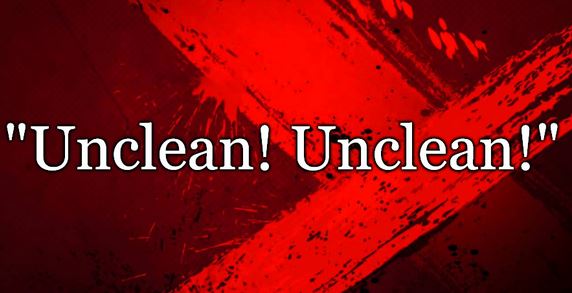
Rabbit Trails: the Leper, the Clean, the Unclean, Menstrual Rags, the Unregenerate… and Jesus
Rabbit trails. That’s what a pastor friend of mine named Ian calls it when his sermons veer off in multiple directions, and that’s what I call it when my biblical studies lead me from one thing to the next to the next.
Rabbit trails. That’s what a pastor friend of mine named Ian calls it when his sermons veer off in multiple directions, and that’s what I call it when my biblical studies lead me from one thing to the next to the next.
One of the reasons for this is the fact that the Bible is so multifaceted. As Caedmon’s Call sings, “The truth is a river, where the strong can swim down deep, and the weak and the broken, can walk across so easily…”[1] Granted there are seasons in life when we keep our distance from the Bible, whether it is because of sin, lethargy, or other issues. But those times we open the Scriptures, and they open to us… Wow. As Ian says, “Christians never walk away from prayer or Bible study saying, ‘Well that was a waste of time.’” I agree with him.
So here’s my rabbit trail:
I was reading the Gospel account of the man with “leprosy” who came to Jesus, begging, and saying, “Lord, if you are willing, you can make me clean” (Luke 5:12). Now this man didn’t just have a spot of disease on his hand or his face; Luke tells us that this man was “covered with leprosy.” God’s Law laid down clear rules for lepers and people with skin diseases. According to Leviticus they had to be kept isolated or quarantined. This was not assigning them to a sterile hospital ward; this was banishment from the people of Israel; this was being kept outside of their camp or their towns and cities. The lepers were considered unclean: “[If] it is a chronic disease on the skin of his body… the priest is to pronounce him unclean. The priest must not merely quarantine him, for he is unclean” (Leviticus 13:11). The leper is banished.
Elsewhere we read: “[The] Lord spoke to Moses: ‘Command the Israelites to expel from the camp every leper…. You must expel both men and women; you must put them outside the camp, so that they will not defile their camps, among which I live.’ So the Israelites did so, and expelled them outside the camp” (Numbers 5:1-5).
Not only did the lepers suffer from disease, from isolation and, most likely, loneliness, but they also had to endure humiliation: “Those who suffer from any contagious skin disease must tear their clothing and allow their hair to hang loose. Then, as they go from place to place, they must cover their mouth and call out, ‘Unclean! Unclean!’” (NLT version of Leviticus 13:45). These people were treated as… well… lepers. People would want to keep away from them, to avoid contact at all costs.
But along came Jesus…
Jesus came into the world, into Israel, into this man’s life, and healed him. Not only did Jesus heal the man, but Jesustouched the man. This man had probably not been touched for years! This demonstrates how very much Jesus cares for the outcast, the lonely, and, yes, the sinner who cries out for cleansing and renewal. Jesus’ love is personal and it’s beautiful. For this I’m thankful, leper that I was…
Now in the case of this healing, as occurs elsewhere, Jesus could have just spoken to the man and healed him (see Luke 17:12-14). After all, according to the Law, a person who touched a leper would become unclean (see Leviticus 5:2-3, etc.). In fact, according to law, anything pure that touched impure would itself become impure. Haggai the prophet underscores this (Haggai 2:11-13). But the opposite occurs when Christ touches the leper. You see when Christ touches the unclean it becomes clean, when He touches the impure it (he/she) becomes pure! The same can be seen in the account of the woman who suffered from a discharge of blood for twelve years. She would have been an unclean outcast as well (Leviticus 15:25). But when she touched the edge of Jesus’ garment, she was cleansed (Luke 8:43-44). By Law the opposite would have happened (Numbers 19:22).[2]
The account of Christ healing these two people and the Jewish laws surrounding the clean and unclean, signify something much deeper. You see, without Christ, every one of us is the unclean one, the quarantined, the banished. As the Bible tells us, “[Your] sinful acts have alienated [separated] you from your God” (Isaiah 59:2). The NASB tells us “Your first forefather sinned” (Isaiah 43:27) and Adam’s fallen, unclean nature has passed down to every one of us (Romans 5:12, 1 Corinthians 15:22), because, as Job pointed out “Who can make a clean thing come from an unclean?” (Job 14:4). The cure, the remedy required, is healing from Jesus; without it, we remain unclean.
“We are all like one who is unclean, all our so-called righteous acts are like a menstrual rag in your sight” (Isaiah 64:6).
In these passages about the clean and the unclean, we also find the reason why the deeds of the unbelievers avail them nothing. All “good deeds” done by the unregenerate, the unsaved unbeliever, are still unclean and rejected in the sight of God. Though humanity may attempt good, and even do subjective good, their very uncleanliness, when it comes into contact (so to speak) with those “good deeds,” makes those deeds unclean, ungood. As was said through the prophet: ‘The people of this nation are unclean in my sight,’ says the Lord. ‘And so is all their effort; everything they offer is also unclean” (Haggai 2:14).
So the unsaved, the spiritually unclean, remain banished, outside of the kingdom of God, separated from spiritual Israel (Romans 2:28-29, Romans 9:6-8) just as the physically and ceremonially unclean were banished from physical Israel. It continues to come together when we realize that Jesus, when speaking about hell, often used the same picture or idea: In fact, half of the times Jesus spoke of (the word translated) “hell,” He was using the name “Gehanna,” which was a valley outside of Jerusalem, a garbage pit where fire continuously burned, consuming discarded refuse. Gehanna was outside.
Consider what Gehanna or “outside of the camp” was biblically: The Israelites were to “go to the bathroom” outside the camp (Deuteronomy 23:12). It appears the dead were taken outside the camp (Acts 14:19). Execution was to be “outside the camp” (Leviticus 24:14, Numbers 15:35). The sin offering to be disposed of “outside the camp” (Leviticus 4:21). And Christ, the Lamb of God, was crucified and offered up “outside the camp” (Hebrews 13:11-12) as sin for us, as the sin offering, “despised and rejected” as the unclean thing in our place (Isaiah 53:3).
Only through Christ are we cleansed. Only through the Perfectly Pure can the impure be purified. One cannot be cleansed by self effort, because that self-effort is itself unclean. One cannot be cleansed by a priest or a prophet, for even priests and prophets are unclean (Hebrews 7:27 and Isaiah 6:5-7). Regarding the spiritually unclean, those whom the Bible calls (yes) “the wicked,” God says that He detests their thoughts and plans (Proverbs 15:26), their path (Proverbs 15:9), and their sacrifice (Proverbs 15:8, Proverbs 21:27).
But along came Jesus…
The sacrifice of the Lamb of God (John 1:29), the unblemished and spotless One (Hebrews 4:15, 1 Peter 2:22-24, 1 John 3:5) makes sinners clean. “God made the one who did not know sin to be sin for us, so that in him we would become the righteousness of God” (2 Corinthians 5:21). Christ loved us so much that He gave Himself to cleanse us, so that we would not have “a stain… or… blemish” (Ephesians 5:25-27). No more menstrual rag uncleanliness.
In the end, those who reject Christ remain outside. In eternity the unsaved “will be thrown outside, into the darkness, where there will be weeping and gnashing of teeth” (Matthew 8:12, NIV, see also Matthew 22:13, and Revelation 22:15).
Thus the call goes out to all outside the camp, to all unbelievers: “Come, let’s consider your options,” says the Lord. Though your sins have stained you like the color red, you can become white like snow” (Isaiah 1:18).
“While Jesus was in one of the towns, a man came to him who was covered with leprosy. When he saw Jesus, he bowed down with his face to the ground and begged him, ‘Lord, if you are willing, you can make me clean.’ So he stretched out his hand and touched him, saying, ‘I am willing. Be clean!’ And immediately the leprosy left him” (Luke 5:12-13).
For those of you who have been cleansed, go out and tell where healing and cleansing can be found, tell what Christ has done for you.
___________________________________________________________________________
To read more of my columns go to https://blogs.bible.org/author/stephen-j-drain/
[1] From the song “Beautiful Mystery” on the Caedmon’s Call CD entitled “Back Home.”
[2] Law only reveals our uncleanness and sin (Romans 3:20). Just recently I heard a GREAT point by a preacher. He pointed out that Moses only gets the Children to the edge of the Promised Land, but not into it. Moses represents the Law. But Joshua (which is closely related to the name “Jesus”) takes the Children into the Promised Land. The Law only takes us to the river Jordan (death). Jesus takes us through death, unharmed, into the Promised Land. (I may have expounded a bit on what he said… rabbit trail.)




One Comment
Bob Miller
A coincidence or not?
Hi Steve,
After reading your post today, I was cleaning my laptop desktop off and found something I saved in a word document back on Tuesday, November 23, 2010. This is all that was in the word document.
Leviticual law vs. Jesus’ Sovereignty “An unclean thing defiles a clean thing; but Jesus could not be defiled, instead, everything He touched became clean.”
So cool when that happens 🙂